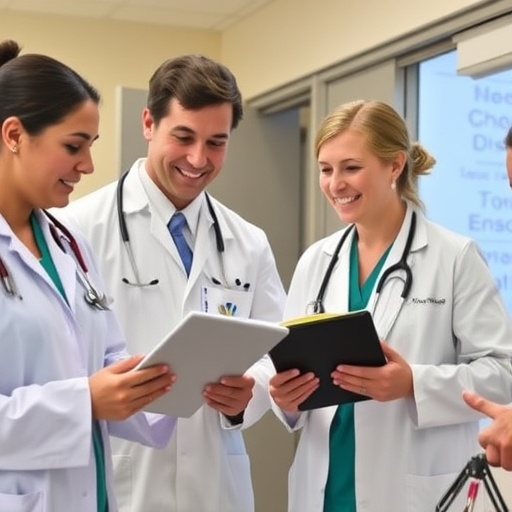In recent years, the landscape of medical education has been dramatically shifting, with a growing emphasis on experiential learning as a cornerstone of student preparedness. A pivotal study conducted by Louey, Zeng, and Roberts, alongside their colleagues, sheds new light on how graduating medical students perceive their readiness for clinical practice. This research correlates the hands-on experiences gained through real-world application with the students’ confidence levels and professional readiness, indicating that the traditional educational models might require significant overhauling.
The transition from theoretical knowledge to practical application does not come without its challenges. Medical students often express concerns about their preparedness to face the complexities of patient care upon graduation. While classroom learning provides essential foundational knowledge, it often lacks the nuanced understanding that real patient interactions can provide. Analyzing the perceptions of students, the researchers underscore the critical nature of experiential learning in bridging this gap, asserting that it must be incorporated systematically into medical training curriculums.
The study utilized a mixed-methods approach, combining quantitative surveys with qualitative interviews to capture a comprehensive view of the students’ experiences. The quantitative data revealed a striking disparity between students who engaged in extensive clinical placements and those who relied primarily on classroom education. Students who had significant exposure to patients reported feeling more competent and confident in their skills, suggesting that direct involvement in clinical settings plays a crucial role in developing their professional identities.
One of the most compelling narratives came from students who recounted transformative experiences during their internships. Many described how shadowing experienced clinicians and participating in patient care directly impacted their learning and self-assurance. These students emphasized that no amount of classroom instruction could replicate the lessons learned from hands-on experiences, such as navigating difficult conversations with patients or managing unpredictable clinical situations. Their testimonials highlight the need for curriculum reform that prioritizes direct patient engagement over traditional lecture formats.
Furthermore, the emotional aspect of experiential learning cannot be overlooked. Many students reported feelings of anxiety and stress regarding their future roles, yet these emotions were alleviated when they had the opportunity to engage in real-world situations. The empowerment derived from practical experience fosters resilience and adaptability—traits essential for successful medical professionals. This emotional correlation suggests that universities and medical schools must also consider the psychological components of learning and preparation to create a more robust educational experience.
Interestingly, the researchers noted that the sense of preparedness varied significantly across different specialties. Students entering high-contact fields, such as surgery or emergency medicine, expressed a greater need for early exposure to clinical environments compared to those pursuing less intense specialties. This finding indicates a unique opportunity for medical schools to tailor their curriculum according to the specific demands of different medical fields, allowing for more personalized education that aligns with student career aspirations.
Moreover, the research prompts discussion regarding the assessment methods used in medical education. Traditional examinations often focus on theoretical knowledge, which may not accurately reflect a student’s practical capabilities or readiness for practice. The authors advocate for innovative assessment strategies that evaluate students’ practical competencies alongside their theoretical knowledge, potentially using Objective Structured Clinical Examinations (OSCEs) or other performance-based evaluations that better mirror real-world scenarios.
Integrating experiential learning with the theoretical frameworks already present in medical education systems can enhance student outcomes significantly. The study argues that developing partnerships with healthcare institutions is vital for creating rich experiential learning opportunities. By fostering such collaborations, educational institutions can ensure that their students not only gain valuable insights from seasoned professionals but also contribute positively to the healthcare community during their training.
As the study highlights the importance of involving students in research and scholarly activities, it encourages an environment where future physicians can actively engage with their education rather than passively absorb information. Such participation not only enriches their learning experience but also builds critical thinking and research skills that are essential in the rapidly evolving field of medicine.
The implications of these findings reach beyond the individual student experience. A generation of medical professionals who feel prepared and confident is crucial for improving overall patient care and outcomes. When medical graduates emerge from their programs with a strong sense of readiness, they are more likely to approach their practices with assurance, ultimately benefiting the healthcare infrastructure as a whole.
In conclusion, Louey, Zeng, and Roberts’s research emphasizes the urgent need for medical schools to rethink and reform their educational approaches to align with the realities of clinical practice. By prioritizing experiential learning, integrating innovative assessment methods, and cultivating strong partnerships with healthcare settings, future physicians can better navigate the challenges of the medical profession. This transformative approach not only enhances the educational experiences of students but also prepares them to meet the complexities of patient care with confidence and competence.
The evolution of medical education is not just a matter of curricular adjustments; it is about reimagining what it means to be a medical student in the 21st century. As the dialogue around preparedness for practice continues, it is imperative that educational institutions listen closely to the voices of their students to ensure that their future practices are informed by the realities of the current healthcare landscape. This study is an important step in that direction, illuminating the path towards a more integrated, experiential, and ultimately successful medical education.
Subject of Research: Perception of preparedness for practice among graduating medical students and the role of experiential learning.
Article Title: Graduating medical students’ perception of preparedness for practice: experiential learning is key.
Article References:
Louey, C.Y.M., Zeng, A., Roberts, S. et al. Graduating medical students’ perception of preparedness for practice: experiential learning is key.
BMC Med Educ 25, 1402 (2025). https://doi.org/10.1186/s12909-025-07801-8
Image Credits: AI Generated
DOI: 10.1186/s12909-025-07801-8
Keywords: Medical education, experiential learning, student preparedness, clinical practice, curriculum reform.




